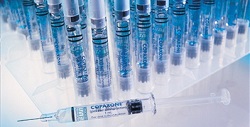The patent on Teva ($TEVA) cancer med Treanda is approaching expiration--meaning that soon, Copaxone won't be the company's only important specialty med facing generic competition. And while the Israeli drugmaker has a next-gen version of the product on the market, that drug doesn't necessarily have what it takes to fill the void.
The way Bernstein analyst Ronny Gal sees it, the new med, dubbed Bendeka, will need its own J-code--a particular code for Medicare billing that eases the reimbursement pathway and allows for price differentiation--if it's going to be successful. And he doesn't foresee it getting one.
As he pointed out in a note to clients on Thursday, the Center for Medicare & Medicaid Services' Healthcare Common Procedure Coding System "has gotten increasingly cost-conscious about awarding J-code for second generation drugs, especially in situations which appear like life cycle management," a la Teva's. And Treanda and Bendeka share the same active ingredient, another factor that he thinks makes it more likely that the agency will have the two drugs share a code.
 If that's the way the decision comes down, Teva could face big consequences. Treanda is Teva's second-largest branded product behind multiple sclerosis standout Copaxone, generating 3.8% of 2015 sales and accounting for about 10% of the pharma's EPS, Gal wrote. He now forecasts that Bendeka will only be able to hold on to about 20% of the market, down from his prior prediction of about 50%.
If that's the way the decision comes down, Teva could face big consequences. Treanda is Teva's second-largest branded product behind multiple sclerosis standout Copaxone, generating 3.8% of 2015 sales and accounting for about 10% of the pharma's EPS, Gal wrote. He now forecasts that Bendeka will only be able to hold on to about 20% of the market, down from his prior prediction of about 50%.
And speaking of Copaxone, that med could hit more trouble soon, too. So far, the treatment has been able to hang on to more than 75% of its market share in the face of generic competition from Novartis' Sandoz, thanks to a new-and-improved version of that drug. But now, knockoffs makers are taking aim that that product, too, with the FDA already reviewing generic applications from companies including Novartis ($NVS) and Mylan ($MYL).